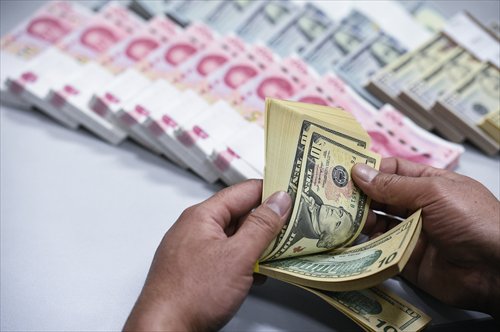Offshore yuan HIBOR hits record high
Rise may be result of effort to curb speculation: experts

An employee at a local bank in Shijiazhuang, capital of North China's Hebei Province, counts money for a yuan-dollar currency exchange on Thursday. Photo: CFP
The offshore yuan-based overnight Hong Kong interbank offered rate (HIBOR) surged to a record high of 66.8 percent on Tuesday, up from 13.4 percent on Monday and 4.0 percent on January 8.
The one-week rate also surged from 11.2 percent on Monday to 33.8 percent on Tuesday.
The spot offshore yuan rate was 6.5790 against the US dollar as of 12:05 pm on Tuesday, according to data from Hong Kong's Treasury Markets Association, while the spot onshore rate was 6.5750.
"The surge of the rate may have been caused by large-scale speculative capital flows, or a move by the Chinese government to curb currency depreciation by buying up yuan offshore," Zhou Yu, director of the Research Center of International Finance at the Shanghai Academy of Social Sciences, told the Global Times on Tuesday.
The overnight offshore yuan-based HIBOR is a daily benchmark for offshore yuan interbank lending. The HIBOR includes overnight, one-week, two-week and one-month rates, which are calculated from rates contributed by 16 reference banks that are active in the yuan interbank market.
Tight liquidity
The HIBOR surge indicates tight liquidity for yuan offshore trading in Hong Kong, said Zhou.
Due to the exchange rate differences between the offshore and onshore yuan markets, speculators have been hoping to make profits through buying yuan in the offshore market and then selling it in the onshore market, which disturbs the normal currency market and contributes to the tight liquidity in the offshore yuan market in Hong Kong, Zhou noted.
The yuan exchange rate declined significantly last week, with the spread between the offshore and onshore yuan market expanding to 1,600 basis points on January 6, a record high, a report from China Business News said on Tuesday.
This prompted many speculators to buy yuan in the offshore market and then sell it onshore, the report said.
Also, it's possible that the People's Bank of China (PBC), the central bank, may be acting through State-owned banks in Hong Kong to aggressively buy yuan in the offshore market in order to curb market expectations for further yuan devaluation, and this could also lead to tight liquidity in the offshore yuan market in Hong Kong, Zhou said.
The offshore yuan market in Hong Kong has been facing pressure from tight liquidity for some time.
Since the PBC adjusted the central parity rate formation system in August 2015, which led to the yuan weakening sharply against the US dollar, there have been expectations in the offshore market for further devaluation of the yuan, Zhou said.
Also, foreign importers hoped to reduce the volume of their yuan holdings through trade settlement with their Chinese suppliers, which has led to a flow of offshore yuan back to the mainland, reducing liquidity offshore, said Zhou.
Restraining speculation
A higher HIBOR rate makes it more expensive for investors to borrow yuan, which will hurt the interests of those investors who are anticipating further yuan devaluation, Tan Yaling, head of the China Forex Investment Research Institute, told the Global Times on Tuesday.
"Furthermore, the move is a positive sign that China's central bank is prepared to support the value of offshore yuan, which is good news for stabilizing the yuan market offshore," said Tan.
"A higher HIBOR rate is effective for narrowing the gap between the offshore and onshore yuan rates, which leaves less space for speculators," Liu Dongliang, a senior analyst at China Merchants Bank, told the Global Times on Tuesday.
The spread between the offshore and onshore yuan market had almost disappeared on Tuesday, Zhou noted.